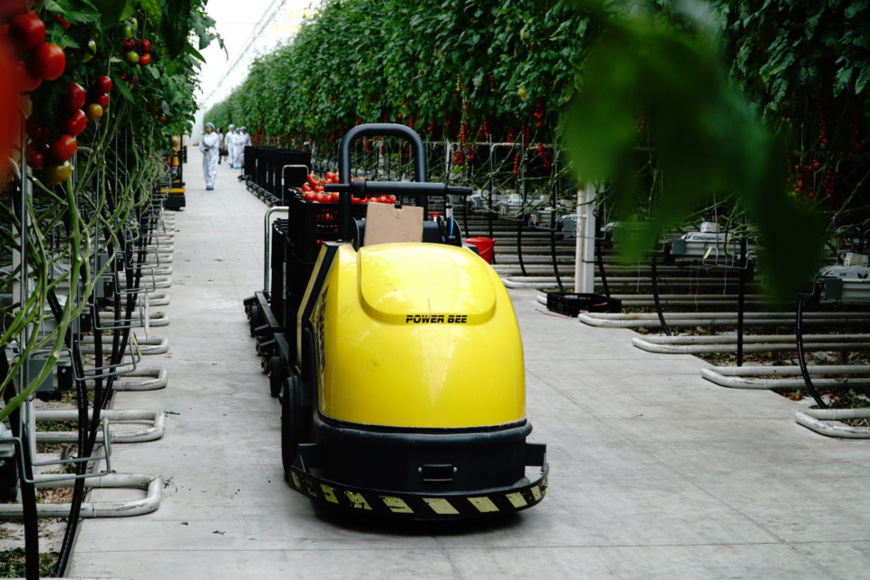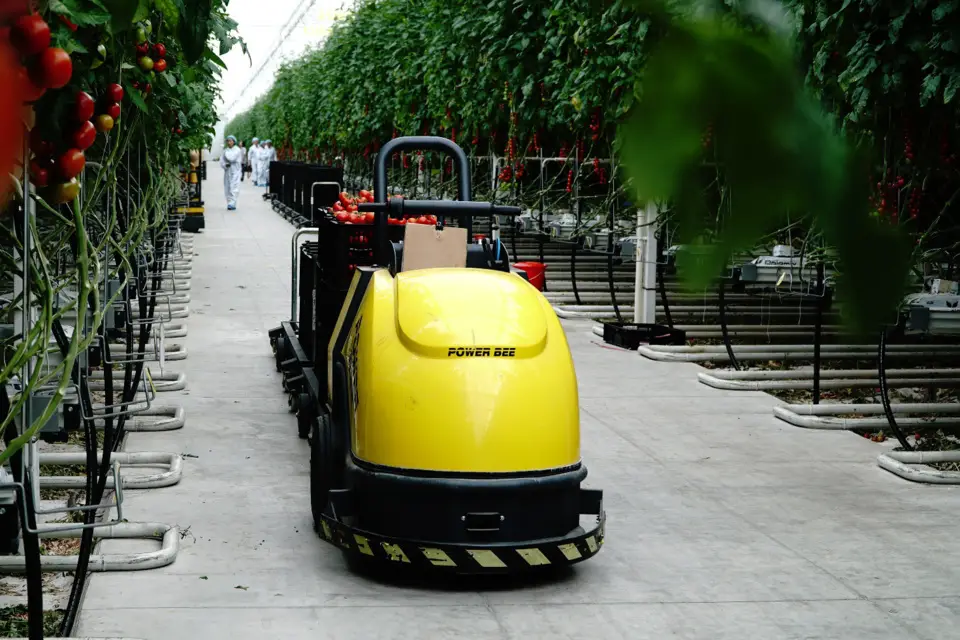By Ji Peijuan from People’s Daily

An autonomous driving vehicle transports tomatoes at a smart greenhouse in Beijing on Apr. 25, 2017. (Photo by He Yong from People’s Daily)
China’s first testing center for autopilot technology is expected to be built in southern China’s Guangdong province.
The Economic and Information Commission of Guangdong province recently disclosed that they have already started autopilot testing at local maker Guangzhou Automobile Group, in cooperation with tech giants Huawei, Alibaba and Tencent.
The decision came amid China’s rapid development in driverless technologies in recent years. Both automobile giants and tech forerunners are now exerting all-out efforts to win a place in the sector of unmanned vehicles.
Robin Li, CEO of Chinese technology titan Baidu, said previously that the mass production of the unmanned mini-buses will begin in July, 2018 under its cooperation with the Chinese well-known bus manufacturer King Long.
More models of autopilot vehicles will be released by the company and its partners, he added on the annual Baidu World Conference on Nov. 16, 2017.
Though the autonomous driving technology is maturing, it still needs road tests to verify whether these innovative vehicles can deal with complex road and traffic conditions.
Beijing announced this January that its first enclosed testing field for self-driving vehicles will be established in its Yizhuang economic development zone. Other facilities will be added to the field to help autopilot vehicles recognize road and traffic signs.
Shanghai also issued regulation guideline on autopilot road tests this March, specifying application requirements for tests.
In addition, China is making laws to supervise autopilot road tests. The country’s Minister of Transport Li Xiaopeng disclosed on Feb. 7 that the ministry has been working on technical plans and specifications for autonomous driving.
The ministry will also build testing centers and work with other departments to formulate guiding policies, according to the minister.
Analysts believe that as both central and local authorities are giving priority to the driverless technologies with an inclusive attitude and far-sighted horizon, a new engine driving economic growth will ultimately be fostered.
The Economic and Information Commission of Guangdong province recently disclosed that they have already started autopilot testing at local maker Guangzhou Automobile Group, in cooperation with tech giants Huawei, Alibaba and Tencent.
The decision came amid China’s rapid development in driverless technologies in recent years. Both automobile giants and tech forerunners are now exerting all-out efforts to win a place in the sector of unmanned vehicles.
Robin Li, CEO of Chinese technology titan Baidu, said previously that the mass production of the unmanned mini-buses will begin in July, 2018 under its cooperation with the Chinese well-known bus manufacturer King Long.
More models of autopilot vehicles will be released by the company and its partners, he added on the annual Baidu World Conference on Nov. 16, 2017.
Though the autonomous driving technology is maturing, it still needs road tests to verify whether these innovative vehicles can deal with complex road and traffic conditions.
Beijing announced this January that its first enclosed testing field for self-driving vehicles will be established in its Yizhuang economic development zone. Other facilities will be added to the field to help autopilot vehicles recognize road and traffic signs.
Shanghai also issued regulation guideline on autopilot road tests this March, specifying application requirements for tests.
In addition, China is making laws to supervise autopilot road tests. The country’s Minister of Transport Li Xiaopeng disclosed on Feb. 7 that the ministry has been working on technical plans and specifications for autonomous driving.
The ministry will also build testing centers and work with other departments to formulate guiding policies, according to the minister.
Analysts believe that as both central and local authorities are giving priority to the driverless technologies with an inclusive attitude and far-sighted horizon, a new engine driving economic growth will ultimately be fostered.
 Menu
Menu
 China’s first testing center for autopilot technology expected in Guangdong
China’s first testing center for autopilot technology expected in Guangdong
















